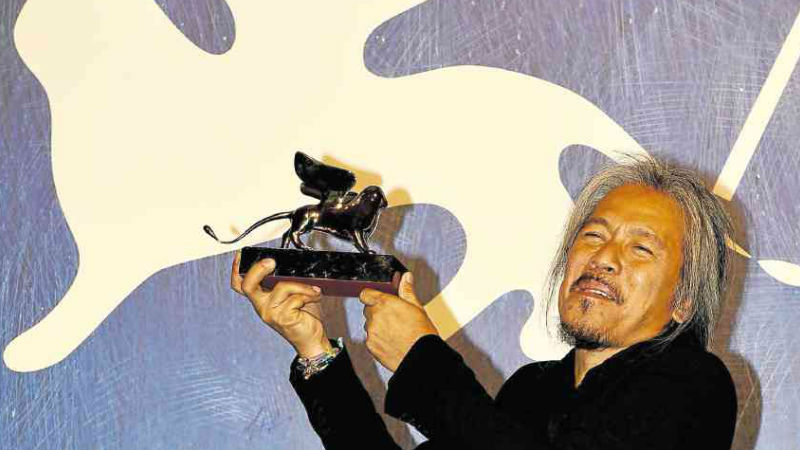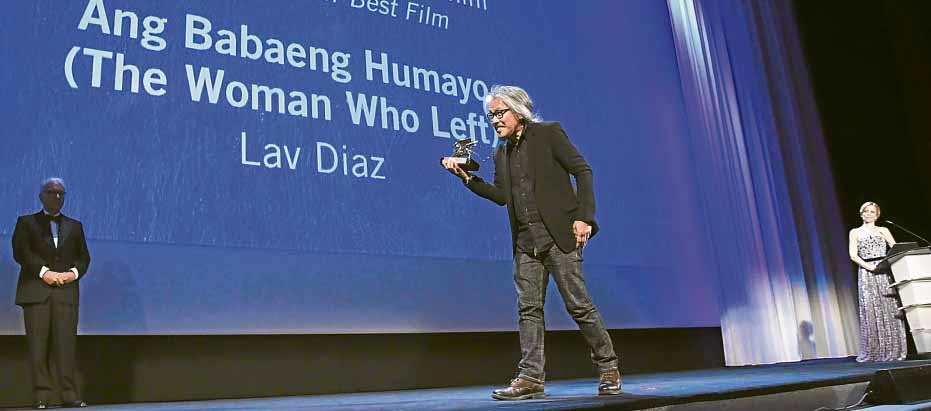Lav Diaz wins top prize in Venice Int’l Film Festival

BEST FILM Filipino filmmaker Lav Diaz’s Golden Lion award for his movie “Ang Babaeng Humayo” during the 73rd Venice International Film Festival in Italy continues the winning streak of the Philippines in the top three A-list film festivals in the world—Berlin, Cannes and Venice—so far this year. AP
LAV DIAZ’S colleagues, like fellow award-winning filmmakers Brillante Ma. Mendoza and Joel Lamangan, and actors Charo Santos and Nonie Buencamino, are rejoicing over Philippine cinema’s latest triumph.
Diaz continues the winning streak abroad of Filipino filmmakers by bagging on Saturday the Golden Lion, the top prize at the 73rd Venice International Film Festival, for “Ang Babaeng Humayo” (The Woman Who Left).
Diaz, 57, has described “Humayo” as a testimony to the struggles of the Philippines after centuries of colonial rule.
“This is for my country, for the Filipino people, for our struggle, for the struggle of humanity,” he said as he accepted the Golden Lion award at the world’s oldest film festival for his black-and-white movie.
“Humayo” is a story about the absurdity of human existence. A wrongly convicted schoolteacher plots retribution against the former boyfriend who framed her, disguising herself in a bid to get close to her prey.
Article continues after this advertisementGaining freedom in the late 1990s after 30 years behind bars, Horacia (Santos) discovers her loved ones are either dead or gone, and the former boyfriend, now a wealthy underworld boss, becomes the target of her simmering rage.
Article continues after this advertisementWinning streak
With Diaz’s latest win, the Philippines has scored major awards from the top three A-list film festivals in the world—Berlin, Cannes and Venice—this year.
In February, Diaz brought home the Silver Bear Alfred Bauer Prize for the eight-hour historical epic, “Hele sa Hiwagang Hapis,” at the Berlinale.
In May, Jaclyn Jose was declared best actress for her role in Mendoza’s gritty urban drama, “Ma’ Rosa,” at Cannes.
Diaz is no stranger to international awards, particularly at the Venice fest.
In 2007, he got the special mention citation in the Orizzonti section for “Death in the Land of Encantos.” The following year, he bagged the Orizzonti award itself for “Melancholia.” Orizzonti is a special section in Venice that highlights “new trends in cinema.”
In 2014, Diaz won the Golden Leopard award at the Locarno International Film Festival in Switzerland, for “Mula sa Kung Ano ang Noon.”
Award collection
His menagerie is almost complete, having won a Golden Leopard, Silver Bear and Golden Lion in two years’ time.
Four hours before the Venice awards ceremony, “Humayo” won best foreign language film at the 6th Smile Awards, also held in Venice.
The award seeks to honor Venice competition films that shed light on the struggles of marginalized people.
A day before the Venice main competition awards ceremony, Eduardo Roy Jr.’s “Pamilya Ordinaryo” won the BNL Audience Award in the 13th Venice Days tilt.
Also on Saturday, Allen Dizon won best actor for his role in Mel Chionglo’s “Iadya Mo Kami” at the 13th Salento International Film Festival in Tricase, Italy.
Mendoza, best director for “Kinatay” at Cannes in 2009, said he was very happy for Diaz, describing his victory as “a historic moment for Philippine cinema. We should all celebrate Lav’s achievement because it has raised Filipino movies to another level again.”
Lamangan, whose film “The Flor Contemplacion Story” won the Golden Pyramid award at the Cairo International Film Festival in 1995, said Diaz’s triumph was a great honor for the country. “Truly, it’s a shot in the arm for our movie industry. Congratulations to Lav!”
Unanimously acclaimed
Diaz’s latest work was unanimously acclaimed by critics, as well.
Dubbed “marathon man” by Screen International for his protracted films, Diaz has shrugged off such criticisms, saying, “My cinema is free.”
He has insisted that he takes an organic approach in filmmaking. “If a film is complete at three hours then it would end at three hours.”
Diaz, also the cinematographer and editor of “Humayo,” said he would not hesitate to delete a “beautiful shot” if it were superfluous.
In “Humayo,” he took a more philosophical route—unlike his earlier works that were overtly polemical and political.

SPOTLIGHT A jubilant director Lav Diaz offers the Golden Lion award for Best Film that he won for “Ang Babaeng Humayo” during the
73rd Venice Film Festival to the Filipino people, their struggle and humanity. AFP
Diaz said he was working on a trilogy on reclusion perpetua. “Stories on prison as a metaphor for the curse of living.”
Inspired by Leo Tolstoy’s short story “God Sees The Truth, But Waits,” Diaz recalled that writing “Humayo” was a breeze. “The story just flowed naturally.”
Logic of living
He asserted: “Existence is so fragile and, in the end, we don’t know anything. The film’s story is simple and complex at the same time. Where’s the logic of living?”
Exclaimed producer Ronald Arguelles of Cinema One (which produced “Humayo”): “I am overjoyed that we got to experience all this.”
Actor Nonie Buencamino, who is in the cast, said: “I am proud, happy and feel very fortunate to be part of this film.”
Santos was similarly ecstatic: “I feel so honored and proud to be part of this special project. What a privilege! God has always been good to me.”
She received rave reviews for her performance. Variety’s Guy Lodge even tweeted that she should’ve won best actress over Hollywood star Emma Stone who brought home the trophy for her role in Damien Chazelle’s musical “La La Land.”
There were reports that the Venice jury couldn’t give other major awards to the Golden Lion winner.
Lodge tweeted: “Stone’s win is a mirage … Santos is the real Oscar frontrunner.” With reports from wires